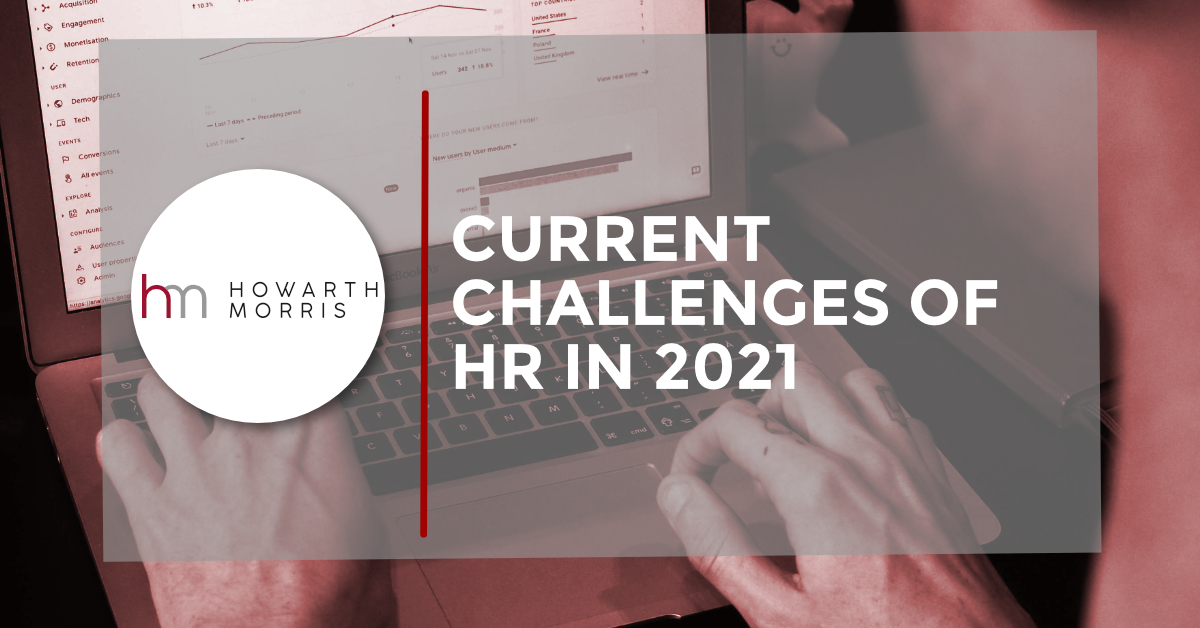Current Challenges of HR in 2021

Here at Howarth Morris, we are dedicated to Progressing Businesses and Progressing Careers, so helping our clients stay ahead of the game has always been a key focus that we are committed to. We achieve this by providing great talent for our clients, and through collating and sharing the latest industry research and insight.
Throughout the past year, HR professionals and their teams have had to fight against unthinkable obstacles, navigating the biggest ‘work from home’ experiment in history. 2020 took an already challenging sector, and heightened it to new levels.
Workforces transitioned to remote work almost overnight, leaving HR professionals to manage the “new normal” as well as negotiate the intricacies of furlough, redundancies and employee engagement, all without a clear picture of what was to come.
As we power through 2021, HR can expect to see some changes that outlast the pandemic; particularly in the ways we work. This will have influence on the companies plans and strategies put in place as they work hard to keep up in the current climate.
Read on to learn three key challenges and trends we can expect to see throughout the rest of 2021…
Diversity and Inclusion
In this challenging landscape, it is vital that diversity and inclusion (D&I) does not plummet on your company’s priority list.
D&I is important because you can achieve:
- Higher revenue growth
- Greater readiness to innovate
- Increased ability to recruit a diverse talent pool
- 5.4 times higher employee retention (To learn more about employee retention and how to improve it, download our free guide)
Respecting the unique needs, perspectives and potentials of team members will result in a stronger, more resilient workforce. Research shows that companies who embrace diverse and inclusive cultures are able to make greater and braver decisions, which is important both within a pandemic and beyond.
Staying up to speed, remotely
Resilience is currently a keyword within the world of HR, and from that, building critical skills and competencies is a top priority. However, this priority has been met with the challenges of keeping qualifications, training and competencies maintained and in order, all while adapting to the new flexible way of working.
A survey which involved more than 800 HR professionals found that the total number of skills required for a single job is increasing by 10% every year, and a third of the skills present in an average 2017 job posting are no longer necessary in 2021. This puts increasing pressure on HR professionals to find a dynamic way of ensuring employees are up to date with training, maintaining and developing the skills needed for their role.
Managing a flexible workforce
Insights show that one fifth (19.1%) of 2,000 UK workers surveyed plan to work from home full-time post-pandemic. If the correct structures are not in place, communication and engagement between employees and their company could slip, having devastating effects on company culture, employee retention and company costs.
Our Director, Paul Howarth, recently highlighted that the market is currently candidate-driven in a three-part blog series; this means that there is a surfeit of demand for candidates and a deficit of supply of candidates. As a result, we strongly advise that you review your employee retention policies to ensure that they reflect a candidate-driven market.
To help HR professionals and employers navigate the management of a flexible workforce, we have developed a range of helpful guides and blogs. Browse below:
⭐️ Mental Health and Wellbeing Guide
⭐️ Guide to Employee Retention
⭐️ How to Overcome Four Key Challenges of Remote Management
We hope you have found this blog both insightful and inspiring. For further information, tips and advice contact us at info@howarthmorris.co.uk.
